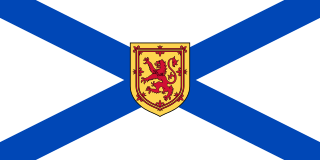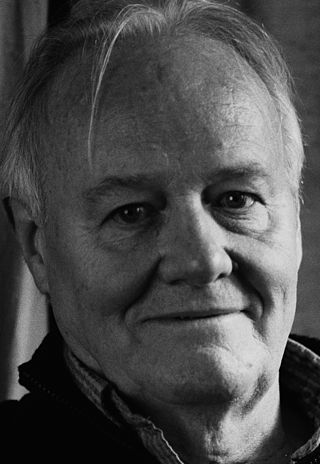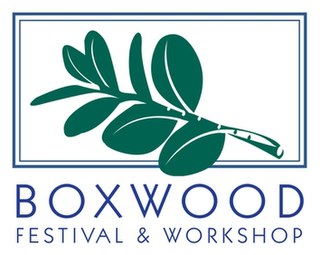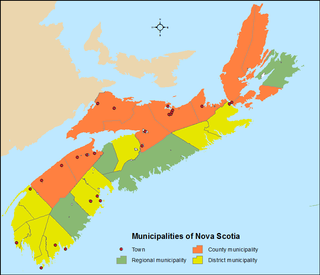Related Research Articles

Acadia University is a public, predominantly undergraduate university located in Wolfville, Nova Scotia, Canada, with some graduate programs at the master's level and one at the doctoral level. The enabling legislation consists of the Acadia University Act and the Amended Acadia University Act 2000.

Nova Scotia is a province of Canada, located on its east coast. It is one of the three Maritime provinces.

Lunenburg is a port town on the South Shore of Nova Scotia, Canada. Founded in 1753, the town was one of the first British attempts to settle Protestants in Nova Scotia.
The music of Canada's Maritime provinces has included many artists from both the traditional and pop genres, and is mostly European in origin. The traditional genre is dominated by the music brought to the region by the European settlers, the most well known of which are the Scots & Irish celtic and Acadian traditions. Successful pop acts from all genres have had degrees of national and international success since the beginning of recorded music period. Performers as diverse as Hank Snow, Stan Rogers, Anne Murray, the Rankin Family, Barachois, The Men of the Deeps and April Wine have all experienced tremendous success as popular music acts with considerable national and international tours and record sales.

Symphony Nova Scotia is a Canadian orchestra based in Halifax, Nova Scotia, Canada. Its primary recital venue is at the Dalhousie Arts Centre's Rebecca Cohn Auditorium.

Mary Helen Creighton, CM was a prominent Canadian folklorist. She collected over 4,000 traditional songs, stories, and beliefs in a career that spanned several decades, and she published many books and articles on Nova Scotia folk songs and folklore. She received numerous honorary degrees for her work and was made a Member of the Order of Canada in 1976.

Peter Anthony Togni is a freelancer Canadian composer and broadcaster based in Halifax, Nova Scotia.

The Raid on Lunenburg occurred during the American Revolution when the US privateer, Captain Noah Stoddard of Fairhaven, Massachusetts, and four other privateer vessels attacked the British settlement at Lunenburg, Nova Scotia on July 1, 1782. The raid was the last major privateer attack on a Nova Scotia community during the war.

The Foreign Protestants were a group of non-British Protestant immigrants to Nova Scotia, primarily originating from France and Germany. They largely settled in Halifax at Gottingen Street and Dutch Village Road as well as Lunenburg.
Allister MacGillivray CM, D. Litt (honors), is a Canadian singer/songwriter, guitarist, and music historian from the Cape Breton region of Nova Scotia. He was born January 17, 1948, in the coal-mining and fishing town of Glace Bay.

Elizabeth Raum is a Canadian oboist and composer.

Michael Bawtree was a Canadian actor, director, author and educator.

The following outline is provided as an overview of and topical guide to Nova Scotia:
Ursula Johnson is a multidisciplinary Mi’kmaq artist based in Halifax, Nova Scotia, Canada. Her work combines the Mi’kmaq tradition of basket weaving with sculpture, installation, and performance art. In all its manifestations her work operates as didactic intervention, seeking to both confront and educate her viewers about issues of identity, colonial history, tradition, and cultural practice. In 2017, she won the Sobey Art Award.
The FV Margaret Jane was a Canadian stern trawler based out of Lunenburg, Nova Scotia. Built in 1965 at Snyder's Shipyard in Dayspring, she was owned by fishing company Adams & Knickle.
The FV Flora Alberta was a Canadian auxiliary fishing schooner based out of Lunenburg, Nova Scotia. She was launched in 1941 by Smith and Rhuland, the company's 187th vessel. The managing owner of the vessel was fishing company Adams & Knickle.

The Boxwood Festivals and Workshops are a series of music and dance festivals and workshops produced by Boxwood Festivals, Ltd., which "aims to provide opportunities for the dissemination, sharing, presentation and celebration of traditional music." There are three multi-day festivals scheduled annually, and other one-off workshops throughout the world. During these three festivals participants are joined by the local community for music, concerts, dances, classes, and informal music sessions. The music workshops are open to players of any instrument and skill level. The three annual events include classes led by Boxwood's Director, wooden flute player Chris Norman, for which he was awarded a Queen Elizabeth II Diamond Jubilee Medal, and Cape Breton fiddle and Baroque violinist David Greenberg. Other artists are invited to lead classes at the Boxwood Canada and Boxwood Williamsburg festivals.
Elizabeth Smith-McCrossin is a Canadian politician. She was elected to the Nova Scotia House of Assembly in the 2017 provincial election. She is an Independent member and represents the electoral district of Cumberland North.
Gordon Stobbe C.M is a Canadian fiddler, multi-instrumentalist, and composer based in Seaforth, Nova Scotia. Stobbe was born in Saskatchewan, but has made his home on the East Coast of Canada since 1977. His musical interests and passion lie in the field of Canadian traditional music, especially as it is expressed in a wide variety of fiddle styles. He plays several instruments, including fiddle, mandolin, guitar, clawhammer banjo, piano, accordion and percussion.

The Canadian province of Nova Scotia is divided into 49 municipalities, of which there are three types: regional (4), town (25), and county or district municipality (20).
References
- 1 2 3 "Rambles: Mary Knickle, Weave". www.rambles.net. Retrieved 2024-07-18.
- ↑ "Artists - Musique Royale". musiqueroyale.com. Retrieved 2024-07-18.
- 1 2 3 "Front Page – Page 20 – Nova Scotia Choral Federation". 2021-11-29. Retrieved 2024-07-18.
- ↑ "Composers/Songwriters". Choral Canada. Retrieved 2024-07-18.
- ↑ "Banks Music Publications".
- ↑ "Composers". Cypress Choral Music. Retrieved 2024-07-18.
- ↑ "Artists & Musicians". Memory Café NS. Retrieved 2024-07-18.
- 1 2 3 4 "AMDA News - Alumna Mary Knickle takes on new musical Morgan Le Fay". www.amda.edu. Retrieved 2024-07-18.
- 1 2 3 4 5 "Mary Knickle". Canadian Music Centre | SydneyEnterprise (Final). Retrieved 2024-07-18.
- ↑ "Laurence Stevenson". Laurence Stevenson. Retrieved 2024-07-18.
- ↑ "Don Moore". North 44° Academy. Retrieved 2024-07-18.
- ↑ "Events for Monday, March 4 – Wednesday, February 14 › Live stream › – Page 3 – UVic School of Music Events Calendar". finearts.uvic.ca. Retrieved 2024-07-18.
- ↑ "UVic Voice Ensemble: Remembering | UVic School of Music Events Calendar". finearts.uvic.ca. Retrieved 2024-07-18.
- 1 2 3 "Celtic MP3s Music Magazine: "Weave" by Mary Knickle". celticmp3s.blogspot.com. Retrieved 2024-07-18.
- ↑ Mitchell, Syne (2007-03-19). "Rigid-heddle Weaving – Betty Linn Davenport". Weavecast. Retrieved 2024-07-18.
- ↑ "Sounis LiveJournal".
- ↑ "Irish & Celtic Music Podcast: Celtic Women of Summer #562". celticmusicpodcast.com. Retrieved 2024-07-18.
- ↑ "3 Hour Celtic Music Retrospective | Celtic Music Magazine". celticmusicmagazine.com. Retrieved 2024-07-18.
- ↑ "Various – Mariposa '96". Discogs .
- 1 2 "CBC Nova Scotia".
- 1 2 3 4 "Mary Knickle". Cypress Choral Music. Retrieved 2024-07-18.
- ↑ "Nova Scotia woman composes tribute to fishermen lost at sea - Halifax | Globalnews.ca". Global News. Retrieved 2024-07-18.
- 1 2 "After the War Virtual Screening | Cantabile Choirs of Kingston". watch.eventive.org. Retrieved 2024-07-18.
- 1 2 "The Association of Canadian Women Composers (ACWC)" (PDF).
- ↑ "KLONDIKE CHRISTMAS". Cypress Choral Music. Retrieved 2024-07-18.
- ↑ "ROBBIE SMITH". Cypress Choral Music. Retrieved 2024-07-18.
- ↑ "Leaf Music Distribution Presents The Robbie Songs Project: A Legacy Choral Tribute to Robbie Smith". 8 December 2023.
- 1 2 "Thousands Tune Into Accomplished Musician Mary Knickle's Song A Rallying Cry For Historic Town: The Battle For Lunenburg's Soul - The Macdonald Notebook". The Macdonald Notebook.ca/. 2023-06-18. Retrieved 2024-07-18.
- ↑ Mary Knickle (2017-07-04). Without Leaving a Wake . Retrieved 2024-07-18– via YouTube.
- ↑ "Mary Knickle Archives". Nova Scotia Photo Album Blog. 2010-01-18. Retrieved 2024-07-18.
- ↑ "South Shore for Haiti". Nova Scotia Photo Album Blog. 2012-03-14. Retrieved 2024-07-18.
- ↑ "Arts Nova Scotia" (PDF).
- ↑ "Mary Knickle – Who Will Take The Throne?". Discogs .
- ↑ "The Maritime Conservatory & The Halifax Explosion - The Macdonald Notebook". The Macdonald Notebook. 2017-12-08. Retrieved 2024-07-18.
- ↑ "Events for July 2024 – Nova Scotia Choral Federation" . Retrieved 2024-07-18.